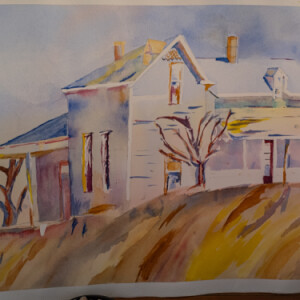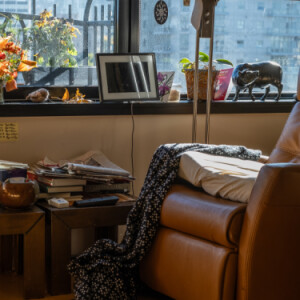Precarious
I asked Margie to tell me more about her painting of a house (First Extra). It’s not a framed painting. It’s just sitting out, a sheet of watercolor paper on a side table, sagging a bit. She painted it when she was in her early 80s, about the time we first met, and I’ve always loved it.
“Oh, I was just copying someone else’s work. I don’t remember whose painting it was.”
I pressed her a little. “But you chose it. You chose to paint a house, and not a flower or a bird or a wine bottle.”
She brightened.
“Oh yes, because it’s like our lives, isn’t it? It’s on a cliff, and the wind and the weather are going to erode that cliff, and eventually that house is going to go. Just like our lives. Pouf! How old am I now?”
“Ninety-seven.”
“Impossible! Me? Am I really that old?” Laughing, she leaned into her old brown leather couch where we sat together, and she made the gesture in the blip. “You see we’re on a tilt, slipping. I think I painted that house because I wanted to remind myself of how…” she searched for a word. “Something with a P?”
“Precarious? Impermanent?”
“No, yes, the first one. Precarious. I never wanted to take anything for granted. Because then you don’t pay attention. And then it’s gone, and you say damn, I should have paid more attention.”
Second extra is Margie’s chair and her blanket, the window sill, the New York Times with her reading glasses, her tiny window garden, her ox, some cut flowers backlit by afternoon sun, everything pretty much just as it has looked for the fifteen years I’ve known her. It feels solid, not a bit precarious. But I’m paying attention.



Comments
Sign in or get an account to comment.


